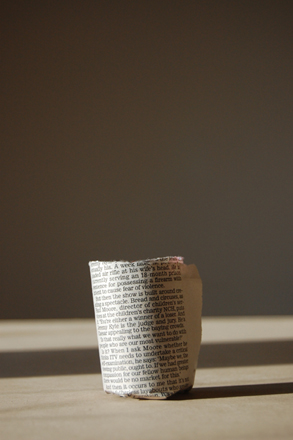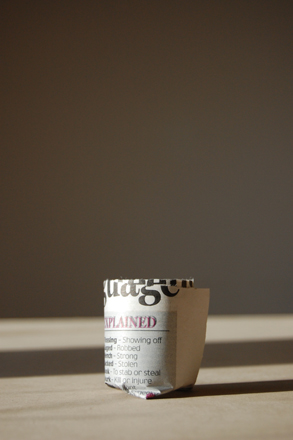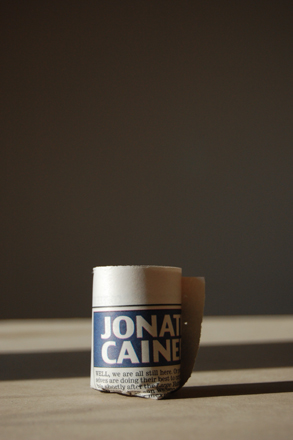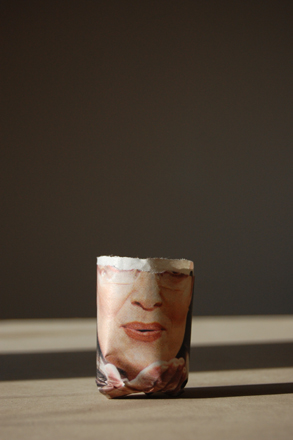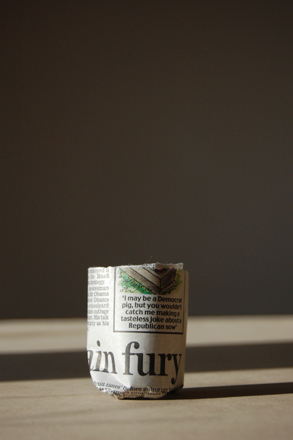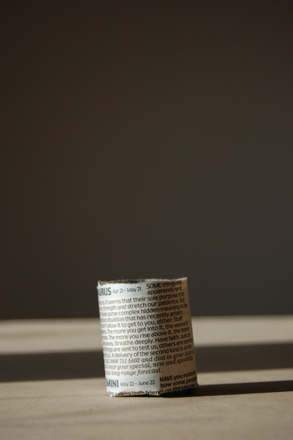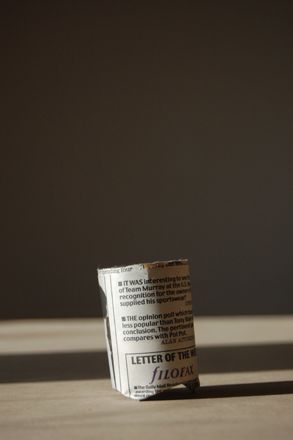That Which Has Become Black
2008
Daily Mail newspaper; compost; Wormwood seeds
These photographs are documents of an ongoing work suggested by Richard Jefferies’ 1885 novel, After London, or, Wild England. The opening chapter, ‘The Great Forest’, describes a future England that has radically changed, much of the south of the country covered in a great lake, and the capital an inaccessible and poisonous swamp; it is this first chapter, to be published separately as an artists’ book, for which these photographs were created by way of illustration.
The photographs show a selection of small pots, made from copies of the Daily Mail, in which Wormwood (Artemesia absinthium) seeds have been sown. Although used for medicinal purposes, Wormwood is extremely bitter, and is related to the Apocalypse through its appearance in the Book of Revelations (8:10–11): ‘And the third angel sounded, and there fell a great star from heaven, burning as it were a lamp, and it fell upon the third part of the rivers, and upon the fountains of waters; And the name of the star is called Wormwood: and the third part of the waters became wormwood; and many men died of the waters, because they were made bitter.’ The Daily Mail seems an appropriate container for such bitter, poisonous material.
As the Ukrainian translation of Common Wormwood (Artemesia vulgaris) is ‘Chernobyl’, it has been suggested that the meltdown of the Chernobyl Nuclear Power Plant on 26 April 1986 might be interpreted as the coming of the catastrophe foretold in Revelations. More literally, ‘Chern-‘ is the root for ‘black’, and while ‘byl’ is a word for grass, it also seems related (perhaps falsely) to the verb ‘to be’; ‘Chernobyl’ therefore suggests both ‘black grass’, and ‘that which is / has become black’.
With thanks to Robert Bird.
2008
Daily Mail newspaper; compost; Wormwood seeds
These photographs are documents of an ongoing work suggested by Richard Jefferies’ 1885 novel, After London, or, Wild England. The opening chapter, ‘The Great Forest’, describes a future England that has radically changed, much of the south of the country covered in a great lake, and the capital an inaccessible and poisonous swamp; it is this first chapter, to be published separately as an artists’ book, for which these photographs were created by way of illustration.
The photographs show a selection of small pots, made from copies of the Daily Mail, in which Wormwood (Artemesia absinthium) seeds have been sown. Although used for medicinal purposes, Wormwood is extremely bitter, and is related to the Apocalypse through its appearance in the Book of Revelations (8:10–11): ‘And the third angel sounded, and there fell a great star from heaven, burning as it were a lamp, and it fell upon the third part of the rivers, and upon the fountains of waters; And the name of the star is called Wormwood: and the third part of the waters became wormwood; and many men died of the waters, because they were made bitter.’ The Daily Mail seems an appropriate container for such bitter, poisonous material.
As the Ukrainian translation of Common Wormwood (Artemesia vulgaris) is ‘Chernobyl’, it has been suggested that the meltdown of the Chernobyl Nuclear Power Plant on 26 April 1986 might be interpreted as the coming of the catastrophe foretold in Revelations. More literally, ‘Chern-‘ is the root for ‘black’, and while ‘byl’ is a word for grass, it also seems related (perhaps falsely) to the verb ‘to be’; ‘Chernobyl’ therefore suggests both ‘black grass’, and ‘that which is / has become black’.
With thanks to Robert Bird.
